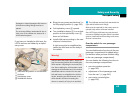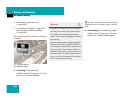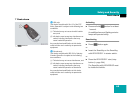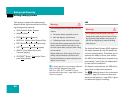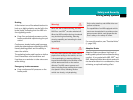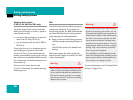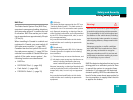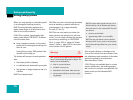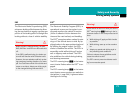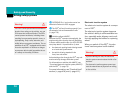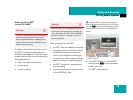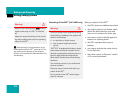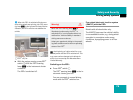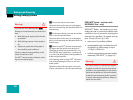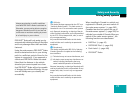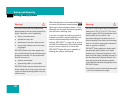
71
Safety and Security
Driving safety systems
EBP
The Electronic Brake Proportioning (EBP)
enhances braking effectiveness by allow-
ing the rear brakes to supply a greater pro-
portion of the braking effort in straight line
braking without a loss of vehicle stability.
ESP
®
The Electronic Stability Program (ESP
®
) is
operational as soon as the engine is run-
ning and monitors the vehicle’s traction
(force of adhesive friction between the
tires and the road surface) and handling.
The ESP
®
recognizes when a wheel is spin-
ning or if the vehicle starts to skid. By ap-
plying brakes to the appropriate wheel and
by limiting the engine output, the ESP
®
works to stabilize the vehicle. The ESP
®
is
especially useful while driving off and on
wet or slippery road surfaces. The ESP
®
also stabilizes the vehicle during braking
and steering maneuvers.
The ESP
®
warning lamp v in the instru-
ment cluster flashes when the ESP
®
is en-
gaged.
The ESP
®
warning lamp v in the instru-
ment cluster comes on when you switch on
the ignition (
୴ page 344). It goes out when
the engine is running.
Warning! G
When the EBP is malfunctioning, the ABS,
BAS, BAS Plus* and ESP
®
are also switched
off.
If the EBP is malfunctioning, the brake sys-
tem will still function with full brake boost.
However, the rear wheels could lock up dur-
ing emergency braking situations, for exam-
ple. You could lose control of the vehicle and
cause an accident. Adapt your driving style
to the changed driving characteristics.
Warning! G
Never switch off the ESP
®
when you see the
ESP
®
warning lamp v flashing in the in-
strument cluster. In this case proceed as fol-
lows:
ț While driving off, apply as little throttle
as possible.
ț While driving, ease up on the accelera-
tor.
ț Adapt your speed and driving style to
the prevailing road conditions.
Failure to observe these guidelines could
cause the vehicle to skid.
The ESP
®
cannot prevent accidents result-
ing from excessive speed.



